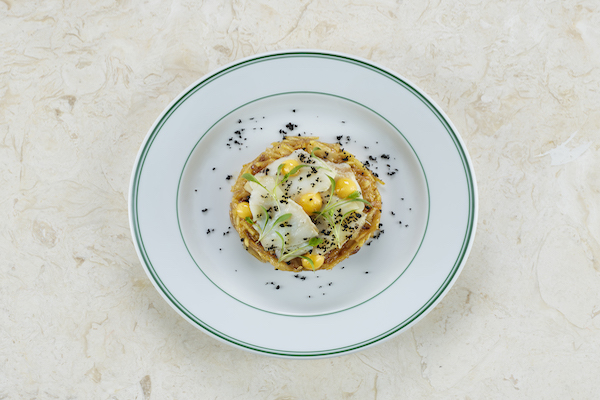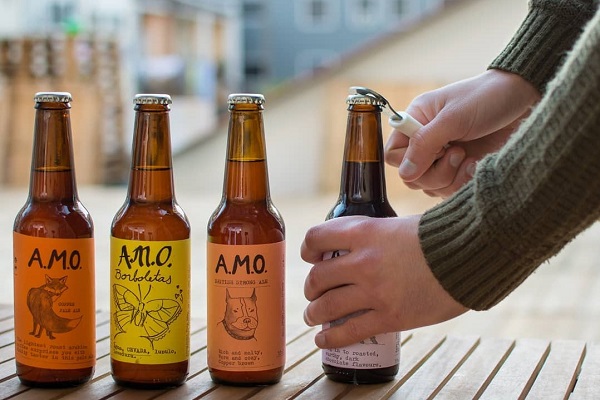Talking about Portuguese food is tricky. Browse a typical restaurant menu, and there’s probably a back story to every single dish.
But at Devour Lisbon that’s precisely what makes us tick. Eating and talking about and eating some more Portuguese food is one of the best things to do in Lisbon, hands down. Now, some might say the Portuguese cuisine is “having a moment” but that “moment” has been here for a while. And it’s impossible to talk about Portugal food facts without mentioning the cultural exchange and influences.

Photo credit: Sea Me; Text overlay: Devour Lisbon Food Tours
1. Salted codfish is not Portuguese
How come the most famous ingredient in Portuguese cuisine, bacalhau, doesn’t come from Portugal? Yes, the Portuguese import salted codfish from Iceland or Norway and, yet, it remains quite affordable. The icy waters fish became part of the Portuguese diet circa the 14th century, around the time of the so-called “Age of Discoveries.” Presumably, salted cod was an alternative to fresh fish then and is now a culinary sensation.

2. Pastel de nata has no cream
Despite the name, nata is the Portuguese word for cream, none is used when baking the delicious bite-sized custard tarts known as pasteis de nata. Only milk, sugar, eggs, and spices go into the custard. To keep that crisp on the outside and creaminess on the inside, the pastries are baked at very high temperatures and for a short period.

3. Afternoon Tea was a Portuguese Habit
When Portuguese princess Catarina de Bragança married English King Charles II in 1662 and moved to England, she carried tea leaves in her luggage. The only Portuguese royal to ever become Queen of England would completely change the British culture with her habit of drinking tea and eating cakes in the afternoon.

Photo credit: Sandra Henriques Gajjar
4. The Biggest Tea Plantation in Europe is on a Portuguese Island
Continuing on the topic of tea, the biggest plantation in Europe is on S. Miguel Island in the Azores. Five generations of entrepreneurs have been running Fábrica de Chá Gorreana since 1883, producing over 40 tons of tea a year. It’s such a high-quality product that it’s one of the ingredients of Lisbon Breakfast, a custom-made blend produced by Companhia Portugueza do Chá and a unique Lisbon souvenir.
5. “Green Wine” is not Green at All
If you expect to see an emerald-green liquid inside a glass when you order vinho verde (“green” wine), you’ll be disappointed. The “green” here stands for young because this slightly sparkling wine undergoes a very short fermentation time. It’s light and fruity, served chilled, paired with petiscos or fish, on a hot Summer day.

6. There’s a Pork Sausage without Pork Meat
No, it’s not a vegan dish. It’s an actual pork sausage that has no pork meat in it, despite looking like a pork sausage on the outside. Confused? The name is alheira and it’s made with chicken and bread instead of pork.
To avoid persecution by the Inquisition in the 16th century, the Portuguese Jewish communities ingeniously disguised their religious beliefs in plain sight. According to the Jewish tradition, they couldn’t eat pork but would stand out from the crowd if they didn’t preserve sausages and hung them for everyone to see. Then, the alheira was born and would, later, become a staple dish of Portuguese cuisine.
READ MORE: A Guide to Portuguese Sausages: 7 Varieties You Should Try & How to Eat Them
7. The Craft Beer Scene is Very Recent
Before 2014, ordering a imperial (draft beer) prompted the question “Sagres or Super Bock?” In many bars, those were the only brands of beer available. Portuguese, mass-produced, and affordable. Eventually, you’d get a Guinness on tap at an Irish Pub, but that was it. Then the craft beer Lisbon scene exploded with Cerveteca, the first craft beer bar in the city.

Photo credit: theblocklisboa
8. You Can Find Good Quality Wine at Supermarkets
Finding a decent wine for under €3.00 a bottle is as easy as going to the wine section at the supermarket. A few guiding rules: bottle not a box, cork not a plastic cap, when in doubt look for the DOC acronym on the label. It stands for Denominação de Origem Controlada and means the wine was produced in one of the oldest wine producing regions. Not ready to commit to a bottle just yet? There are plenty of Lisbon wineries to get acquainted with the best wines.
9. Starters at Restaurants are a (Paid) Habit
Enter a Portuguese restaurant and, in most of them, a waiter will put a basket of bread, olives, and cheese on the table without asking your permission. You’d assume it’s complimentary considering you didn’t order it and they didn’t ask you, but the surprise comes when it’s time to pay the bill. Typically, that set of appetizers won’t cost more than a few euros and most customers won’t see it as a big deal. That said, if you don’t want it, send it back.
Are you coming to Lisbon?
Don’t waste a single meal—check out our ultimate foodie guide to
where to eat in Lisbon!
10. There’s no Such Thing as “Portuguese Food”
The cuisine is Mediterranean, and yet you can tell it apart from the Greek, the Italian, or the Croatian. The bacalhau is Norwegian or Icelandic. The spices are Indian. The chili and peppers are South American. And the cataplana (fish stew) is Moorish. Olive oil is a basic ingredient and the wine production a key economic activity, but it’s an inheritance of the Arabic and Roman past, respectively.
All the dishes that make up the so-called Portuguese Cuisine is a mix of centuries of cultural influences, and that’s what makes it unique.

As you can see, we love anything and everything that has to do with Portuguese food, and we want to share the love. Check out our Tastes & Traditions of Lisbon Tour, where we’ll show you some of our favorite foodie spots in town and provide insider info on how to eat like a local—the kind of stuff you won’t find in any guidebook!
Very interesting about foods as you said portuguese cuisine is not portuguese . if u go by history then most countries doesnt belong to the actual country lisbon down was moorish. So is all united states. English. French mexican
Isn’t it so interesting to see what the history of foods and ingredients tells us about the history of a place?
Portuguese food is the best and Portugal is amazing
Couldn’t agree more, Liseta! Thanks for reading!
All the food and comments are true .just do not understand why why Lisbon only ….
Do you find the best american food in DC? Or french in Paris? There are a lot other popular and portuguese foods thru all the country and as it is not very big you travel a few km and the food and taste as well as the wine is totally different.. A lot more than what you found in Lisbon. Try it
Thanks for reading, Fausto! We focus on Lisbon because that’s where most of our readers are visiting, but couldn’t agree more that Portugal as a whole has some seriously incredible food!
Informative post! We recently got our Portugal Visa UK and we were in full swing when it came to preparing our travel itinerary. We finalized all the destinations that we wanted to visit and the fun activities that we would like to do. But your blog gave us a new perspective in Portuguese food. We’re glad to have come across your post because now we will truly understand the history & the interesting facts of every popular dish that we eat.
Thanks for reading, we’re glad you found it useful!